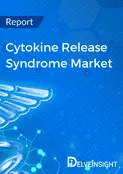

The Cytokine Release Syndrome Market has established itself as a vital sector within the biopharmaceutical landscape, propelled by breakthrough innovations in immunotherapy and cellular-based cancer treatments. CRS represents a systemic inflammatory response that may develop following specific oncology treatments, especially CAR-T cell therapies and monoclonal antibody administrations. With these cutting-edge therapeutic approaches receiving continued regulatory endorsements and extending across diverse cancer types, the need for robust CRS management interventions has surged dramatically.
Market Evolution and Expansion Patterns
The Cytokine Release Syndrome Market Size has experienced remarkable development recently, mirroring the widespread integration of immunotherapeutic approaches throughout global oncology settings. Market experts forecast vigorous expansion patterns, with projections indicating compound annual growth rates surpassing double-digit percentages extending through the decade's conclusion. This upward trajectory stems mainly from escalating hematological malignancy rates, mounting CAR-T cell therapy approvals, and enhanced clinical recognition regarding CRS detection and therapeutic intervention.
Multiple elements fuel this market's progressive trajectory. The transformative impact of CAR-T cell therapies in addressing treatment-resistant blood malignancies has fundamentally altered oncological treatment frameworks. Nevertheless, CRS persists as among the most notable adverse reactions linked to these interventions, manifesting in considerable patient percentages. This intrinsic complication demands accessible, effective management protocols, consequently stimulating demand for CRS-targeted therapeutics and comprehensive supportive care approaches.
Moreover, the extension of CAR-T cell therapy applications beyond blood cancers toward solid tumor treatment is anticipated to expand the at-risk patient demographic, thereby increasing the serviceable market scope. The advancement of innovative immune checkpoint inhibitors and bispecific T-cell engaging therapies, which similarly may provoke cytokine release, additionally magnifies market potential.
Industry Leadership and Competitive Environment
Cytokine Release Syndrome Companies participating in this therapeutic arena span from multinational pharmaceutical corporations to focused biotechnology enterprises. Market leadership belongs to organizations possessing approved medications specifically designated for CRS intervention. Roche's tocilizumab (Actemra), functioning as an IL-6 receptor antagonist, has achieved standard-of-care status for moderate-to-severe CRS presentations, capturing dominant market positioning following its indication approval.
Additional prominent participants encompass Novartis, developer of Kymriah (tisagenlecleucel), representing one of the groundbreaking CAR-T cellular therapies requiring established CRS management frameworks. Gilead Sciences, operating through its Kite Pharma division, commercializes Yescarta and Tecartus—both CAR-T treatments carrying CRS susceptibility. These organizations have committed substantial resources toward patient safety initiatives and healthcare practitioner education programs to enhance CRS management outcomes.
Emerging biotechnology firms concentrate on advancing next-wave therapeutics featuring enhanced safety characteristics or innovative mechanisms for CRS prevention or mitigation. Various biotech entities explore prophylactic strategies, combinatorial therapeutic regimens, and alternative cytokine-targeting compounds potentially offering benefits beyond current treatment options. Organizations including Incyte Corporation, leveraging their JAK inhibitor platforms, alongside others developing corticosteroid substitutes, exemplify the innovative development pipeline addressing CRS management gaps.
Therapeutic Interventions and Management Protocols
Contemporary CRS management employs stratified approaches determined by severity classification. Mild presentations may necessitate exclusively supportive interventions, whereas moderate-to-severe cases demand pharmacological treatment. Tocilizumab maintains its position as foundational therapy, although corticosteroids frequently supplement treatment when IL-6 blockade demonstrates inadequate response. The therapeutic landscape encompasses active pharmaceutical agents alongside diagnostic instruments, monitoring technologies, and supportive care products fundamental to holistic patient management.
Research initiatives increasingly emphasize comprehending the intricate immunological pathways underlying CRS to engineer more precision-targeted interventions. Biomarker identification constitutes a particularly dynamic research domain, with companies investing in diagnostic platforms capable of predicting CRS emergence or intensity, facilitating proactive therapeutic implementation.
Geographic Market Distribution
Regionally, North America holds the predominant position in market share, sustained by sophisticated healthcare infrastructure, elevated CAR-T therapy implementation rates, and advantageous reimbursement environments. The United States specifically leads regarding both CAR-T therapy authorizations and treatment administration volumes. Europe represents the secondary market, with nations including Germany, the United Kingdom, and France exhibiting substantial cellular immunotherapy adoption.
The Asia-Pacific territory constitutes the most rapidly expanding market segment, driven by broadening healthcare accessibility, rising cancer incidence, and increasing investments in advanced therapeutic infrastructure. China has materialized as an exceptionally vibrant market, with indigenous CAR-T developers entering the competitive landscape and influencing pricing structures.
Prospective Development and Market Prospects
Progressing forward, the market stands positioned for sustained growth as cellular therapy innovations continue evolving. The emergence of ready-to-use allogeneic CAR-T products, expansion into pediatric applications, and investigation of combination immunotherapy protocols will likely elevate CRS occurrence, maintaining market momentum. Furthermore, as clinicians accumulate greater CRS management experience and treatment protocols achieve standardization, market penetration throughout emerging territories is projected to accelerate substantially.
Latest reports offered by Delveinsight
Hyperglycemia Market | IBAT Inhibitor Market | Peripheral SPA Market | Ventilator Market | Coronary Guidewires Market | Diagnostic Imaging Equipment Market | Gene Therapy Market | GPCR-targeting Therapies Market | Late-stage Chronic Kidney Disease Market | JAK Market | Liquid Biopsy in Cancer Diagnostic Market | CAR T Cell Therapy for NHL Market | Peripheral Nerve Injury Market | B-cell Maturation Antigen Targeted Therapies Market | Mammography Devices Market | Pachyonychia Congenita Market | Postmyocardial Infarction Syndrome Market | Spinal Fusion Devices Market | Substance Drug Abuse Market | Surgical Sealant Market
About Delveinsight
DelveInsight is a leading healthcare-focused market research and consulting firm that provides clients with high-quality market intelligence and analysis to support informed business decisions. With a team of experienced industry experts and a deep understanding of the life sciences and healthcare sectors, we offer customized research solutions and insights to clients across the globe. Connect with us to get high-quality, accurate, and real-time intelligence to stay ahead of the growth curve.
Contact Us
Kanishk
kkumar@delveinsight.com